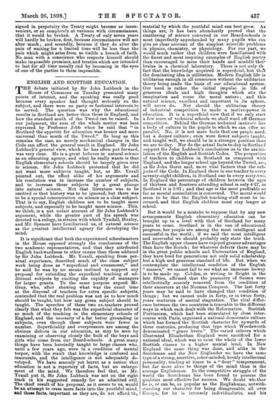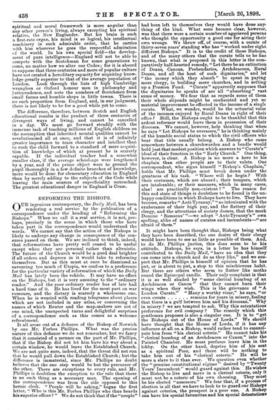ENGLISH AND SCOTTISH EDUCATION. T HE debate initiated by Sir John
Lubbock in the House of Commons on Tuesday presented many points of interest, and the speaking was really good because every speaker had thought seriously on the subject, and there were no party or factional interests:to be served. The question was why the educational results in Scotland are better than those in England, and how the standard south of the Tweed can be raised. In our judgment, the sum of the whole matter was best expressed by Professor Jebb when he said that "in Scotland the appetite for education was keener and more universal than south of the Tweed." So long as this remains the case, no merely mechanical changes in the Code can affect the general result in England. Sir John Lubbock's general view, which he has often put forward, was very clear. He is a great believer in natural science as an educating agency, and what he really wants is that English elementary schools should be largely given over to science. Sir John Lubbock protested that he did not want more subjects taught, but, as Mr. Yoxall pointed out, the effect alike of his arguments and his resolution was to increase the number of subjects, and to increase those subjects by a great plunge into natural science. Not that literature was to be omitted or that history was to be ignored, but there was to be a special concentration on science as a class subject. That is to say, English children are to be taught more subjects, and especially to be taught more science. This, we think, is a not unfair account of Sir John Lubbock's argument, while the greater part of his speech was devoted to a eulogy, in strains with which Tyndall, Huxley, and Mr. Spencer have familiarised us, of natural science as the greatest intellectual agency for developing the mind.
It is significant that both the experienced schoolmasters in the House opposed strongly the conclusions of the two academic representatives, and that they attributed English backwardness to other causes than those adduced by Sir John Lubbock. Mr. Yoxall, speaking from per- sonal experience, described much of the class subject work being done as "superficial and evanescent," and he said he was by no means inclined to support any proposal for extending the superficial teaching of ad- ditional subjects by exciting the cupidity of managers for larger grants. To the same purpose argued Mr. Gray, who, after showing what was the exact time at the disposal of teachers for extra specific subjects, contended that the real problem was not as to how much should be taught, but how any given subject should be taught. The speeches of these two ex-teachers proved clearly that what they felt was the superficial character of so much of the teaching in the elementary schools of England, and the necessity of a far better grounding in subjects, even though these subjects were fewer in number. Superficiality and overpressure are among the obvious defects in our education, as may be seen by examining or observing closely the bulk of the boys and girls who come from our Board-schools. A great many things have been hurriedly taught to large classes who, until a few years ago, were in a condition of mental torpor, with the result that knowledge is confused and inaccurate, and the intelligence is not adequately de- veloped. We have scarcely yet learnt as a nation that education is not a repertory of facts, but an enlarge- ment of the mind. We therefore feel that, as Mr. Yoxall put it, Sir John Lubbock was not on the right track in his suggested remedy for an admitted evil. The chief result of his proposal, as it seems to us, would be an attempt to cram more facts into the youthful mind, and these facts, important as they are, do not afford the material by which the youthful mind can best grow. As things are, it has been abundantly proved that the smattering of science conveyed in our Board-schools is most imperfectly apprehended by many pupils who can give no clear account of the simplest scientific problems in physics, chemistry, or physiology. For our part, we would much rather that children were familiarised with the finest and most inspiring examples of English poetry than encouraged to mess their hands and muddle their brains in a chemical laboratory. There is not only th• fact that the knowledge acquired is superficial, but the.% the dominating idea is utilitarian. Modern English life is utilitarian enough in all conscience without the utilitarian theory being made the basis of our educational system. Our need is rather the initial impulse in life of generous ideals and high thoughts which stir the imagination and rouse the moral nature ; and this natural science, excellent and important in its sphere, will never do. Nor should the utilitarian theory of industrial competition be made a motive-power in education. It is a superficial view that if we only start a few score of technical schools we shall ward off German competition. Behind the German technical institute lies a body of culture in the pupils to which we can offer no parallel. No, it is not more facts that our people need, but a deeper culture ; even were fewer subjects taught, and taught well, we should be in a stronger position than we are to-day. Nor do the actual facts to-day in Scotland support Sir John Lubbock's conclusions as to the assimi- lation of the English and Scottish Codes. The proportion of teachers to children in Scotland as compared with England, and the longer school age beyond the Tweed, are, as Sir John Gorst said, more vital factors than the sub- jects of the Code. In England there is one teacher to every seventy-eight children, in Scotland one to every sixty-two. In England the percentage of children between the ages of thirteen and fourteen attending school is only 4.27, in Scotland it is 591; and that age is the most profitable so far as mental assimilation is concerned. The moral would seem to be that the English teaching staff must be in- creased, and that Euglish children must stay longer at school.
But it would be a mistake to suppose that by any new arrangements English elementary education can be brought up to a level with that of Scotland for many years to come. Scotland is in the van of educational progress, her people are among the most intelligent and successful in the world ; if we said the most intelligent and successful we should probably only state the truth. The English upper classes have enjoyed greater advantages than have the Scotch; for whatever defects there may be in the great public schools and Universities of England, they have bred for generations not only solid scholarship but a high and generous standard of life. But when we contemplate the intellectual condition of the English "masses," we cannot fail to see what an immense leeway is to be made up. Cobden, in writing to Bright in the late fifties, affirmed that the peasantry of Sussex were intellectually scarcely removed from the condition of their ancestors at the Norman Conquest. The last forty years may be said to have changed that condition of things ; but we cannot undo in forty, or in twice forty, years centuries of mental stagnation. The vital differ- ence between the two countries is traceable to the different ways in which each dealt with the Reformation. Scottish Puritanism, which had been stimulated by close inter- course with Paris, organised a national democratic culture which has formed the Scottish character for upwards of three centuries, producing that type which Wordsworth denominated "grave livers." The varied colours which illustrated Elizabethan England were sacrificed for a national ideal, which was to raise the whole of the lower Scottish classes to a higher mental level. In New England the same thing was done, and. alike in the Scotchman and the New Englander we have the same type of a strong, assertive, sober-minded, keenly intellectual personality, tending at times to a " dour " temperament, but far more alive to things of the mind than is the average Englishman. In the competitive struggle of the world the Scotchman has been found to possess the qualities most effective for success. We doubt whether he is, or can be, as popular as the Englishman, notwith- standing our character for being disagreeable all over Europe, for he is intensely individualistic, and his spiritual and moral framework is more angular than any other person's living, always excepting his spiritual relative, the New Englander. But his brain is such a first-rate organ, his mind is so logical, his intellectual machinery in such admirable order, that he carries with him wherever he goes the respectful admiration of the world. In his own special field—the develop- ment of pure intelligence—England will not be able to compete with the Scotcbman for some generations to come, no matter how we alter our Codes ; for it is absurd to suppose that three centuries and more of popular culture have not created a hereditary capacity for acquiring know- ledge greatly superior to that of the average population of London. Look through the lists of high Cambridge wranglers or Oxford honour men in philosophy and jurisprudence, and note the numbers of Scotehmen from small farms and humble shops in little towns. There is no such proportion from England, and, in our judgment, there is not likely to be for a good while yet to come.
The difference, therefore, between Scotch and English educational results is the product of three centuries of divergent ways of living, and cannot be cancelled in a day. We must go forward steadily with the immense task of teaching millions of English children on the assumption that inherited mental qualities cannot be revolutionised all at once, and that it is of infinitely greater importance to train character and intellect than to rush the child forward to a standard of mere acquisi- tion of knowledge of which at present he is scarcely capable. If the individual teacher had a somewhat smaller class, if the average school-age were lengthened by a year, and if the prime object were to ground the pupil thoroughly in a few definite branches of knowledge, more would be done for elementary education in England than by merely adding to the subjects of the Code while leaving the main sources of superficiality untouched. The greatest educational danger in England is Cram.







































 Previous page
Previous page